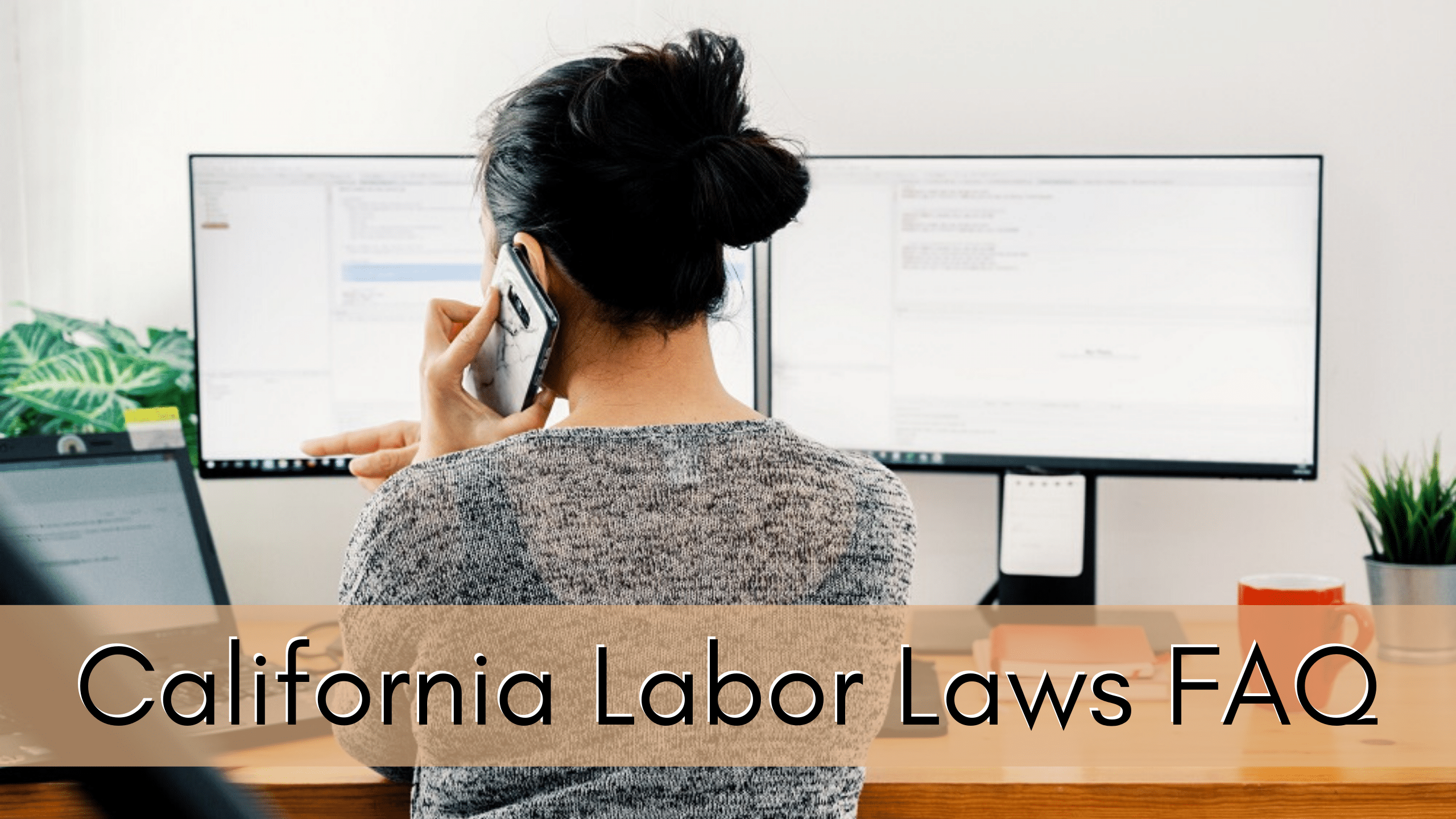California labor laws are designed to protect workers from bad business practices, and they’re pretty comprehensive. In many cases, California’s laws are more protective of workers than federal laws are, and courts here generally fall back on the laws that provide more protection when an issue arises.
But what do California labor laws cover? Here’s what you need to know.
California Labor Laws 101
California labor laws cover things like:
- Employee termination
- Family Medical Leave Act
- Independent contractors
- Meal and rest breaks
- Minimum wage
- Overtime pay
- Sexual harassment
The basics of each law is covered in the table below.
Employee Termination
Wrongful dismissal of an employee is illegal in the state of California. An employer can’t fire you because of your:
- Race
- Gender
- Pregnancy
- Religion
- National origin
- Sexual orientation or gender expression
Employers also can’t fire you because you’re classified as a whistleblower or because you filed complaints about discrimination, either. It can’t let you go because you formed a union with other workers, reported sexual harassment, or took time off for a protected absence, either. Finally, your employer can’t fire you because you refused to commit an illegal act, like covering up theft or embezzlement.
You may be able to sue for wrongful termination.
 Family Medical Leave Act
Family Medical Leave Act
The Family Medical Leave Act, or FMLA, is a form of worker protection that gives some employees up to 12 weeks of unpaid leave each year. Employers aren’t allowed to violate the FMLA by firing you or using your leave against you.
Some of the basic protections under FMLA include:
- 12 workweeks of leave in a 12-month period for birth, adoptive and foster parents
- Leave to care for a parent with a serious health condition
- Leave for a serious health condition that makes a person unable to perform his or her job
- Leave to care for a spouse, son or daughter who has a serious health condition
The FMLA also has provisions for military service members.
Independent Contractors
There are some key differences between independent contractors and employees, and California labor laws address those differences. Employers don’t have to pay payroll taxes or overtime to independent contractors, or reimburse them for business expenses. Also, employers don’t have to cover independent contractors under workers’ compensation insurance, disability insurance, unemployment insurance or Social Security.
Meal and Rest Breaks
California labor law governs meal breaks and rest breaks for workers. Under the law, employees are allowed a 30-minute meal break after a 5-hour shift and a 10-minute rest break for a shift that lasts 3 hours and 30 minutes to 6 hours; for shifts that last between 6 and 10 hours, employees are entitled to two 10-minute rest breaks. These breaks are supposed to be paid.
Related: California Employee Rights Handbook
 Minimum Wage
Minimum Wage
Minimum wage falls under California labor law. If your employer doesn’t pay you minimum wage, you may be able to sue for the amount that it owes you. California’s minimum wage recently increased, so it’s a good idea to make sure your employer is on-par with what the law requires.
Overtime Pay
Overtime is closely tied to minimum wage under California labor laws. In the state of California, non-exempt employees must be paid 1.5 times their regular rate for hours worked over 8 in a day or over 40 in a week. There are also rules for employers whose employees work more than 12 hours per day or more than 8 hours on the seventh consecutive day of work; those employers must pay twice the employees’ regular rate in those instances.
Sexual Harassment
Sexual harassment is illegal, and it typically takes one of two forms: quid pro quo or hostile work environment harassment. If you have been subjected to sexual harassment in the workplace, you could be covered under our state’s labor laws – and you could be eligible to sue your employer for damages.

California Labor Laws: FAQ
California labor laws can be a bit confusing, so here are a few of the most common questions people have. If you don’t see your question answered here, please feel free to call us at 818-659-8331 or 800-774-4163.
How Many Days Can You Work Without a Day Off in California?
Within one workweek, you can work 6 days in a row in California. Then, your employer has to give you a day of rest. However, the employer’s workweek is what matters here – so if it’s from Monday to Sunday, that’s when you’re entitled to your day of rest. Here’s where it gets tricky: Your employer can require you to work Tuesday through the next Saturday without giving you a day of rest. Here’s what that would look like on a calendar:
|
Monday |
Tuesday | Wednesday | Thursday | Friday | Saturday |
Sunday |
| Day of rest | Work | Work | Work | Work | Work | Work |
| Work | Work | Work | Work | Work | Work | Day of rest |
In this example, you are getting one day of rest per workweek – you have your first day of rest on Monday, and your second day of rest on Sunday of the following week.
And even then, there are exceptions. The California Supreme Court has ruled that an employer can require you to skip a rest day “when the nature of the employment reasonably requires that the employee work seven or more consecutive days, if in each calendar month the employee receives days of rest equivalent to one day’s rest in seven.”
In some cases when you’re a part-time worker, the seventh-day rest day doesn’t apply to you. Your employer can have you work more than 6 consecutive days if your total work hours don’t exceed 30 hours in one week or 6 hours in any one day of that week.
Related: California employment law basics
Does California Have Overtime After 8 Hours or 40 Hours?
California requires employers to pay workers overtime (1.5 times their regular pay) for working more than 8 hours in one day and for working more than 40 hours in one week. Additionally, the law requires employers to pay workers overtime for the first 8 hours they work on the seventh consecutive day in one workweek.
Related: California overtime laws
How Many Hours Does a Salaried Employee Have to Work in a Day in California?
If you are a nonexempt salaried employee, you’re entitled to overtime if you work more than 8 hours in one day or more than 40 hours in one workweek. However, if you’re an exempt employee, you may not qualify for overtime pay if you work more hours. It’s up to your employer to prove that you’re an exempt employee, though, and usually these are the requirements:
- You must be paid a salary that’s at least twice the state’s minimum wage for full-time employment
- Your primary duties must consist of administrative, executive or professional tasks
- Your job duties must involve the use of discretion and independent judgment
If you’re not an exempt employee, then your employer is required to pay you overtime if you work enough hours to qualify for it. To determine your regular rate of pay:
- Multiply your monthly salary by 12 to find your annual salary
- Divide your annual salary by 52 to determine your weekly salary
- Divide your weekly salary by 40 (the maximum number of regular hours) to get your regular hourly rate
For example, if you make $4,000 per month, here’s what your calculation would look like:
$4,000 x 12 = $48,000 per year
$48,000/52 = $923.08 per week
$923.08/40 = $23.08 per hour
At a salary of $48,000 per year, you make $23.08 per hour when you work a regular 40-hour workweek. When you work more than 40 hours (or more than 8 hours in a day), you’re most likely entitled to overtime pay of 1.5 times your regular rate ($23.08 x 1.5 = $34.62 per hour).

What Are the New Labor Laws for California for 2020?
Labor laws change frequently in California. As of 2020, employers that have 26 or more employees must pay at least $13 per hour in most locations. (Some cities have higher minimum wage requirements, which you can learn about on our California minimum wage page.) The exempt annual salary threshold is now $54,080.
Can I Refuse to Work Overtime in California?
Mandatory overtime isn’t prohibited in California, so if you refuse, you could lose your job. However, the Fair Labor Standards Act requires employers to pay workers time-and-a-half for any hours worked over 8 in one day or 40 in one week.

Is Sunday Double-Time in California?
Sunday isn’t automatically double-time in California. If you work on Sunday, you’re only entitled to double-time pay in California if you work more than 8 hours if it’s your seventh consecutive day of work (the first 8 hours are then payable at 1.5 times your regular rate) or if you work a total of 12 hours – and then, it’s only for the hours you worked over 12.
Can My Employer Force Me to Work 7 Days a Week?
Your employer may be able to force you to work 7 days a week – but it depends on how you’re defining a week. The California Supreme Court decided in Mendoza v. Nordstrom Inc. that an employer cannot force you to work 7 days in one workweek; the employer must give you one day of rest per workweek. The court defined a workweek as a period defined by an employer, so it can be from Sunday to Saturday, from Monday to Sunday, from Tuesday to Monday, and so on. That means if your employer gives you the first day of its workweek off, it can tell you that you must work every day until the last day of the next workweek. That’s a total of 12 days of work out of 14, but your employer is giving you one day of rest per workweek.
This is what that kind of workweek would look like on a calendar:
|
Day 1 |
Day 2 | Day 3 | Day 4 | Day 5 | Day 6 |
Day 7 |
| Day of rest | Work | Work | Work | Work | Work | Work |
| Work | Work | Work | Work | Work | Work | Day of rest |
Can You Be Fired for Any Reason in California?
California is an at-will employment state. That means your employer can fire you for any reason (except a discriminatory one) and you can quit for any reason. If your employer fires you for a discriminatory reason, you may be able to file a wrongful termination claim.
Related: Wrongful termination and discrimination in California
Can You Get Fired for Not Wanting to Work Overtime?
In California, you can get fired for not wanting to work overtime. Mandatory overtime isn’t prohibited by the Fair Labor Standards Act.
Related: What is the Fair Labor Standards Act?

Is It Legal to Work 16 Hours a Day?
It’s legal to work 16 hours a day, and it’s legal for your employer to require you to do so – as long as your employer gives you the right compensation and the required rest periods. If you work more than 8 hours in one day, your employer must pay you overtime (that’s 1.5 times your regular rate of pay) for each hour you work over that amount. If you work more than 12 hours in one day, your employer must pay you twice your regular rate of pay for every hour you work over that amount.
Example:
If you make $20 per hour, your employer has to pay you $30 for every hour you work over 8 in one day. If you work more than 12 hours, your employer has to pay you $40 for every hour you work over 12 in one day.
In addition to paying you properly, your employer has to provide you with the following rest breaks:
- One 10-minute rest break during a shift lasting between 3.5 hours and six hours
- Two 10-minute rest breaks during a shift lasting between six hours and 10 hours
- One 30-minute meal break during a shift lasting more than five hours
- Two 30-minute meal breaks during a shift lasting more than 10 hours
Can My Employer Make Me Work 12 Days in a Row?
Technically, your employer can make you work 12 days in a row. That’s because your employer is only required to give you one day of rest in every 7-day workweek. If your employer gives you the first day of its workweek off, your boss can require you to work the next 12 days in a row – as long as you get the last day of that second workweek off as a day of rest. The employer’s workweek can start on any day of the week.
Here’s a situation in which your employer could make you work 12 days in a row on a calendar:
|
1st day of workweek |
2nd day of workweek | 3rd day of workweek | 4th day of workweek | 5th day of workweek | 6th day of workweek |
7th day of workweek |
| Day of rest | Work (Day 1) | Work (Day 2) | Work (Day 3) | Work (Day 4) | Work (Day 5) | Work (Day 6) |
| Work (Day 7) | Work (Day 8) | Work (Day 9) | Work (Day 10) | Work (Day 11) | Work (Day 12) | Day of rest |
How Far in Advance Must a Work Schedule Be Posted in California?
In California, predictive scheduling – the practice of providing employees with an advance work schedule – is only the law in some cities (such as San Francisco, which requires employers to provide schedules 2 weeks ahead of time). There is no statewide or federal law that requires businesses to give you a schedule any set period in advance – although several bills to make this type of law have been proposed in the past.
Do You Need to Talk to a Lawyer About California Labor Laws?
This isn’t a comprehensive list of all the facets of the workplace that our state’s labor laws cover. If you think your employer violated California labor laws, though, we may be able to help you. Call us at 818-659-8331 or use our toll-free number, 800-774-4163, for a free consultation. Tell us about your situation and we’ll help determine whether you have a case – and if you do, we’re here to help you get the compensation you deserve.





